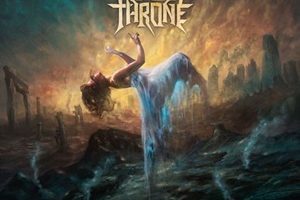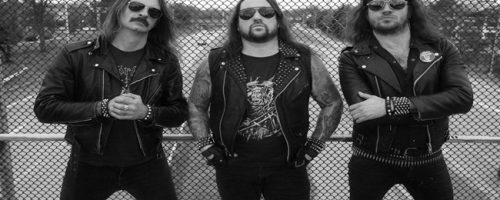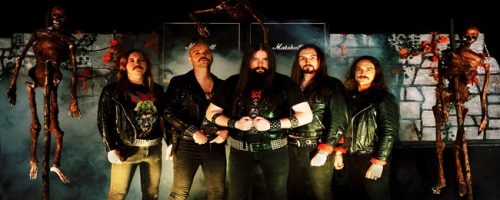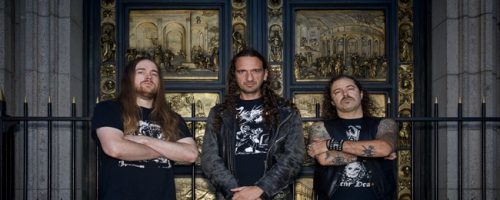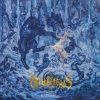Idol Throne – Attack the Raven’s Blade
Tuesday, 16th August 2022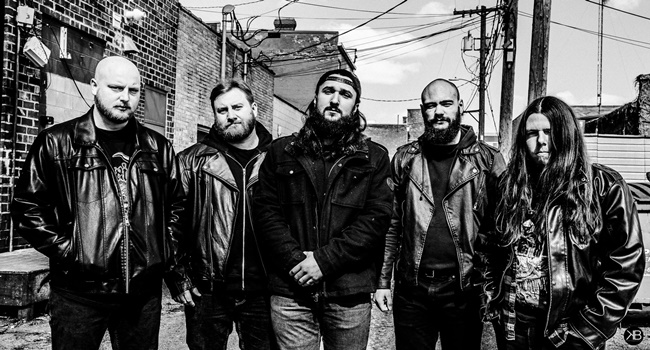
Newer bands often face an uphill climb to establish presence and credibility in a sea of releases, especially in the metal landscape. One act rising to that challenge is Midwestern quintet Idol Throne through their outstanding debut album The Sibylline Age. Assembling a mixture of influences across the traditional, power, thrash, and neoclassical platforms, listeners can expect a sound that is quite musically advanced yet also melodic, sure to garner approval from a host of followers across multiple spectrums.
We reached out to guitarist Jason Schultz and he was happy to enlighten us on his own musical history into metal from childhood, the original ideas behind Idol Throne and philosophy behind this debut album, lyrical themes, outlook on live performances, the importance of Megadeth, Symphony X and Nevermore to his outlook on the genre, plus what we can expect from these musicians in Idol Throne and their other projects/bands in the future.
Dead Rhetoric: What can you tell us about your earliest memories regarding music during childhood? At what point did you make the jump into heavier forms of music – and eventually the desire to pick up an instrument and perform your own music?
Jason Schultz: I have always been into music. Music was always played – my folks were always into classic rock stuff, so that was also around. I remember my dad liked Pink Floyd and Boston, my mom listened to more Jethro Tull and Yes, more progressive rock stuff. I know that I got lucky in my formative years, I was big into the punk rock stuff. I had a guy that lived down the street who got me into metal, guitar, and it was a really big turning point for me. I would always see him out in the garage, his name was Kevin, he was playing guitar listening to Rust in Peace, Metallica, Testament, that early stuff. I thought it was cool music, I started hanging with him and he let me borrow some CD’s. From there, I started questioning him about the guitar. And by Christmas I asked for a guitar, my parents were supportive of that, and I stuck with it. I was off to the races from there.
I got into different styles of metal, the thrill of discovery. A lot of Metallica, Megadeth, Testament, Overkill, the early thrash stuff. From there, I wanted to just be a rhythm guitar player. I enjoy it and had an affinity for it. From there I started getting into the thrash metal lead guys – Marty Friedman, Alex Skolnick, and that lead me to all the Shrapnel stuff from the 80’s – Jason Becker, Vinnie Moore. That led me to the progressive realm, Michael Romeo from Symphony X, Dream Theater, progressive metal. That all kind of compounded and set us on the path of doing music and being in bands for the last twenty years.
Dead Rhetoric: Idol Throne recently released their debut album The Sibylline Age on Stormspell Records. What can you tell us regarding the year-long recording process – how did the sessions go, and how do you assess this set of material and what you wanted to achieve as a band with this record?
Schultz: It was definitely a learning process. We have all been involved in other bands – Martin had a progressive rock band called Farwatch that is still going in some capacity, and I was doing a band called Mind’s Horizon. That’s a studio project that we haven’t done anything with as of yet. We did things DIY with this – and the good thing is you save a lot of money, but the bad thing is you have a lot of time to do it – if you have all the recording stuff it takes the pressure off, but you feel like you are slaving over things, you have no deadline, tweaking things too much. We knew consciously once we had our batch of songs that became The Sibylline Age that we wanted to do it in a way that there was an end in sight.
We laid it out, we had all the songs more or less done going into early 2021. We released a demo at the beginning of 2021, most of that to let people know the album was in the works but that it probably wouldn’t be out until 2022. Early in 2021, when we had the song structures, we went into the studio. All the drum tracks were done in two days, two ten-hour sessions. Then we tracked all the guitars and bass ourselves. I have a Kemper digital amp, he has an Axe-FX which is very similar, allowing us to record after work. I went over to his place at 10 at night to do rhythm tracks, and while that was done, we had the bass tracks in places. We did it old school – two tracks with me on the left, two tracks with Martin on the right. We wanted it as real as it could be in today’s day and age, trying to emulate things as old school as possible. We booked more studio time late in 2021 with all the remaining recordings. We re-amped the guitar tracks, we did the vocals in the same studio that we did the drum tracking in, we were there for three days, and Jake sang all the songs, we did the harmony vocals, some gang vocals too. We got out of the studio in December 2021, sent it out to our mixing guy Lukas Roth Sounds in Austria in January/ February 2022, and the mastering was done by V. Santura in Woodshed Studios in Germany in late March. We hooked up with Stormspell, put the release together, and that was it.
We spent the time and the money to do things right to get that good sound. We didn’t want things to sound like every other modern record that you’ve heard over the last ten years. I think we achieved that result. You can always do better, but I am pretty proud of what we’ve done.
Dead Rhetoric: Combining different subgenres across the metal platform in terms of progressive, thrash, neoclassical, and traditional styles, you also wanted to keep the tones and production values ‘vintage-modern’. Can you elaborate on how you went about achieving this, and do you believe this helps Idol Throne stand out against others when it comes to the sound you achieved?
Schultz: Yes, definitely. It was really cool that I appreciate your review for the site, you definitely got where we were coming from and what we are going for as far as the sound mash-up. Martin and I decided to collaborate with this band starting in 2018. We were in different bands, we wanted to get out more on the live slate. This was the guiding principle, Martin is a big power metal guy, especially US power metal. I am a big thrash guy – a lot of the Bay Area bands, and the European bands like Artillery, Paradox, other big influences for me. I hadn’t been able to do anything like that, and neither had he, so when we got together organically, he brought in the riffs that would become “The Labyrinth” and I brought in the riffs that would become “Sacred Fire”. We knew that given our backgrounds that there would always be a progressive element to it, I really wanted to focus on the thrash sounds and he wanted to inject some power metal. We both have some of the same influences with the neoclassical, shred thing. We were both excited to write more adventurous stuff, challenging and fun to learn how to play.
Once we sat down and formulated what would become the first batch of songs, we had “The Labyrinth”, “Sacred Fire”, “Power and Control”, “The Sibylline Age” and then started messing around with other ideas. “Crown of Fools”, “Unholy Warrior”, some of those songs were cropping up. It seemed like an interesting mix of things. I have a hard time sticking to one style, which has become boring. For me I wanted to keep things somewhat open-ended, but not let the imagination run too wild. We also tried knowing our musical personalities to keep things as focused as possible too. I would be the guy in the past that would write the fifteen-minute-long song, so it’s been refreshing to work with these guys and write shorter songs in a compact format.
Dead Rhetoric: Where did you want to come across with the lyrical content for this album? Do you believe the band places equal importance on the words, the melodies, and the vocal delivery as the musical components?
Schultz: Yeah, definitely. That’s kind of the funny thing. Being involved in bands over the years, and I know the rest of the guys have faced this, when you are talking lyrics, a lor of people say they don’t care what it is lyrically, as long as the melodies are strong. I personally am a lyric guy – I pour over it, I’m big on the concept of things. I will map stuff out – to give an example, the song “The Sibylline Age”, I had this image in my head that I wanted to do something that you don’t know if it’s modern day, or old, or fantasy – but this world in decline and you follow this character in the song is trying to travel to this oracle to get the answer. Ultimately, it’s all moot, the oracle talks about heeding the warning a long time ago. That becomes the story, I told the guys that, and from that seed all the guys ended up taking a part and verse in the song. I wrote some of it, Martin and Jake wrote some of it. It ended up informing the cover art as well. Mark Erskine ended up totally crushing it on the art concept.
Martin wrote the lyrics to “Unholy Warrior” and “The Labyrinth”. I wrote “Raven’s Blade” lyrically, all the melodies. All of the songs have some sort of thematic thing, something going on where there’s a story there. A lot of thought into that story. It’s as cool with the subject matter as the music, it’s a lot of fantasy realm stuff versus personal life things. We want to have it fun, but have it be with some thought behind it. A lot was put into the melody front as well as the lyrical front. We wanted to make sure that we were writing things that fit, and that Jake was comfortable with. A lot of the stuff towards the end of the process, he would scrap what was there and come up with different melodies as he got comfortable with the band. He was the last member of the band to join, so he made his own mark on this.
Dead Rhetoric: Was it intentional that the band came up with a longer instrumental track “Last Full Measure”?
Schultz: That one actually in my mind, and Martin might tell you differently, he thought that was going to be a vocal song. I thought it was always going to be an instrumental piece. I had a few riffs that came together in a sequence, 30 seconds of a song. Brought it to band practice, they thought it was cool. Martin as he does, he added some of the main melodies and different parts. We arranged it, and when you put it together, but we didn’t know how it would flow with drums and other elements added to it. Adding in the acoustic guitars, keyboard parts, layering, that type of thing. It is one of my favorite songs on the album. I just love that song, where it goes and how it goes. We want to do our version of a classic metal record, and a lot of those records have an instrumental on them. I’m thinking “Losfer Words”, a three- or four-minute piece. By the time we were done, it was almost eight-minutes long, the second longest song on the album. It’s the perfect length, tells a story. It will be tough to play that one live.
Dead Rhetoric: How would you describe the outlook and philosophy of Idol Throne when it comes to your live performances compared to what people hear from you on the record? What have been some of your more memorable shows to date for the band?
Schultz: That was the big thing for us, we wanted to do things as honest as we can. When you come see us live, you will get the record, if not better. Again, it goes back to the recording process. We consciously wanted to record things organically. All the tools are great to use in the studio, but you can become too reliant on those things. Every riff on the album, I play on that left track, Martin plays on the right track. A lot of the solos were one-takes. We tried to be as organic as we could, the drums, the vocals. It’s a good representation of what we will sound like live. We want to capture that energy as best as we could.
The reviews from the live shows have been very positive so far. We have only done five or six shows – of course every band dealt with the pandemic. We started in 2018, by the time we solidified the lineup it was early 2020. You know what happened in early 2020. We went into writing mode. We didn’t think we would have the pandemic years. We wanted to get out to play shows when it was safe. We’ve been developing band chemistry on stage, good turnouts, and we are excited going into the tail end of this year. We will be playing a thrash festival in Kentucky with Exhorder and Byzantine. We are also playing at Reggie’s in Chicago soon. We are looking for more opportunities to do the same thing. Maybe Hell’s Heroes or the Stormbringer Festival, we want to play more in 2023 and jump on local shows as well.
Dead Rhetoric: What would you consider three of the most important bands that helped shape your outlook on heavy metal as a genre – as well as fuel inspiration for your approach to songwriting?
Schultz: Oh wow. That’s a tricky one. I’ll try to pick one of each from the styles that I love. If I had to pick one of the classic thrash metal bands, as much as Metallica was a huge influence for me as I’m sure for everybody, I would go to like Megadeth. Specifically, the Marty Friedman era, Rust in Peace, Countdown to Extinction. I love the way that Marty, his solos were almost a song within a song, it made the lead playing tasty and musical. And also, especially Rust in Peace, there is stuff on there we never really heard before. In the formative years, one of my first records was Countdown to Extinction. I ended up discovering a lot of the modern bands like Lamb of God, Shadows Fall, a thousand bands that were popular at the time, but Megadeth really resonated with me.
In terms of another band that made a huge impact on me, it would be Symphony X. I like progressive metal, Dream Theater, Fates Warning, Symphony X, a lot of those bands in the 90’s. I buy those records and still go see them live. Looking back at that whole era of Symphony X, The Divine Wings of Tragedy, The Odyssey, it had a huge influence. I love how wide open that type of music can be. When metal and progressive rock is done right, it can tell a story. They are playing solos, the musicianship, it’s focused on a story. It lets me zone out and some of the epic songs tell a story for twenty minutes or more. For me it’s inspiring. They transport you to another world.
For the third band, I’m trying to think. On the heavier realm, Nevermore. They are a huge influence. I got to play a show with Jeff Loomis while in Mind Horizon. I got to meet him; he was super cool. He gave me nice feedback. I loved how melodic that band was. We don’t play that low or tune down, playing seven-strings. Awesome band, I saw them live a few times and I was super sad when Warrel Dane passed away. Just a great band overall, I spin those records all the time.
Dead Rhetoric: How do you see the state of the world currently? If you had unlimited time, energy, resources, and finances, what area(s) do you think you would put the most emphasis on to make things more manageable for the greater good of all?
Schultz: Right now, with my background in education in political science and social studies, I have a bachelor’s degree and a master’s degree, that whole realm. It’s interesting to watch the way things have changed in school. The professors I had would probably laugh at how much has happened and so many things have changed in just the last decade. Regardless of the side of the political spectrum you are focused on, I wish there was more understanding, a push or sense of objectivity. There is no eye to eye anymore, and it’s a shame. Playing shows and being out in the metal community, I’ve met so many cool people and had so many great experiences, it’s been great even if people don’t agree politically. We as people have a lot in common, but if I had unlimited resources, I would put them towards a lot of the things that maybe aren’t cool. The environment, the long-term things that are starting to affect us now. A lot of this stuff gets lost in the weeds. Try to restore some objectivity and have some compassion and constructive conversations.
Dead Rhetoric: What’s next on the agenda for anything Idol Throne related over the next twelve months – and please let us know about the other bands/projects that the members are involved in and if there are future plans/releases on the horizon?
Schultz: The big push now is to get the show on the road. We are looking for more opportunities to play. Personally, Wraith is very busy right now. We get a lot of opportunities for touring, festivals. We just got back from Ohio. I want Idol Throne to get to that point. We would love to play locally, regionally, nationally, and internationally. We want to do our best to promote our music and get it out there to as many people as possible. When they see us play, they know it’s the real deal. We have a lot of material for whatever our next release is going to be. We have a lot of opportunity to jam now, compile ideas for songs.
Our drummer Aaron has a band called Axxios, they are more blackened power metal, they are gigging around the local area. Martin is working on some Farwatch material, but I don’t know when that will be released. Our bassist Trevor has a band called Xenopredator, a technical death metal project. I don’t think they are currently doing anything. Jake our singer is also in Mind’s Horizon with me, and it’s an interesting thing. We have a ton of material waiting to be finished. We wrote a double album, so we are trying to finish that second disc. I would like to say this will be out in 2023, but I’ve been saying that for the last five years (laughs). A lot of music. It’s full-blown progressive rock: Yes, Rush, Genesis, very different. Wraith will be putting out a split record with other bands in September, three new songs. It’s blackened thrash, straighter and to the point songs. I’ve been playing with those guys since 2018, it’s a total blast.











